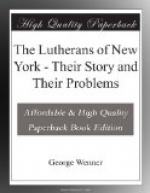There is a fourth class of which no note is taken in our church records. It is the class of lapsed Lutherans-that is, of those who have been admitted to full communion but who have slipped away and are no longer in active connection with the church.
Of these we shall speak in a separate chapter.
It is sometimes charged that the Lutheran communion does not hold clear views of the church. On the one hand her confessions abound in definitions of the church as a spiritual kingdom, as a fellowship of believers. On the other hand her practice frequently reminds our brother Protestants of the Catholics, and they are disposed to look upon us as Romanists, minorum gentium. “Like a will-of-the-wisp,” says Delitzsch, “the idea of the church eludes us. It seems impossible to find the safe middle ground between a false externalism on the one hand and a false internalism on the other hand.”
The Lutheran position can only be understood when we recall the situation that confronted the Reformers in the sixteenth century. They had first of all to interpret the teachings of Scripture over against Rome, and hence in their earlier confessions they emphasized the points on which they differed from the Pope.
According to Romish doctrine a man became a member of the church, not by an interna virtus, but solely through an external profession of faith and an external use of the sacraments. The church is as visible and perceptible an organization as is “the kingdom of France or the republic of Venice.” The church is an institution rather than a communion.
For thirteen centuries, from Cyprian to Bellarmin, this doctrine held almost undisputed sway.
The Reformers demonstrated the significance of faith, and showed the untenableness of Rome’s conception of the church as a mere institution. Thomasius calls this a central epoch in the history of the world. But at the same time the Reformers had to take a stand against the hyperspiritual positions of the fanatics, as well as the teachings of the Zwinglians who denied the efficacy of the means of grace. The confessions, therefore, as well as the subsequent writings of Melanchthon and the dogmaticians, and the entire history and development of the Lutheran churches must be read in the light of this two-fold antagonism.
The system which the Reformers controverted must have had features acceptable to the natural man or it would not have prevailed for so many centuries. Hence it is not surprising when Romanism creeps back into nominally Protestant churches. It behooves us, therefore, to be on our guard and to purge out the old leaven. And the opposite tendency which undervalues the visible church, must also be corrected by a Scriptural doctrine of the ordinances.
The practice of our churches is a resultant mainly of three forces:
1. Doctrine, defined in the Confessions, modified by Melanchthon’s later writings and by the dogmaticians of the 17th century, considerably influenced also by Spener and the Pietists, while not a little has come to us from the Rationalistic period.




